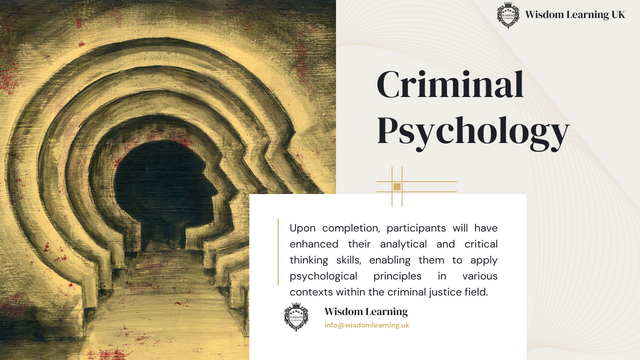Criminal Psychology

The Criminal Psychology course covers a wide array of topics, from the basics of criminal psychology to the role of mental disorders in criminal behaviour, the classification of different types of crimes, the application of forensic science in crime investigation, the study of victimology, and an in-depth look at the criminal justice system in England and Wales. By the end of the course, students are expected to have a thorough understanding of the complexities of criminal behaviour, the various factors that contribute to it, and the multifaceted responses required by society to address and mitigate its effects.
Who is this course for?
- Psychology Graduates: Ideal for those with a background in psychology looking to specialise in the field of criminal psychology.
- Law Enforcement Professionals: Police officers, detectives, and other law enforcement officials seeking to understand the psychological aspects of crime.
- Legal Professionals: Lawyers, judges, and legal consultants interested in gaining insights into criminal behaviour for application in legal cases.
- Criminal Justice Students: Individuals pursuing studies in criminal justice who wish to incorporate psychological perspectives into their learning.
- Mental Health Professionals: psychiatrists, psychologists, and therapists aiming to understand the nexus between mental health and criminal behaviour.
- Forensic Science Enthusiasts: Individuals interested in the intersection of psychology and forensic science in the context of crime investigation.

What I will learn?
- Comprehensive Understanding of Criminal Psychology: Gain in-depth knowledge of the theories, research, and practical aspects of criminal psychology.
- Identification and Analysis of Various Crimes: Learn to classify and analyse different types of crimes, including misdemeanours, felonies, white-collar crimes, and more.
- Insight into the Criminal Mind: Develop an understanding of what drives criminal behaviour, including the impact of mental disorders and personality traits.
- Skills in Forensic Science Application: Acquire knowledge in forensic science and its applications in crime investigation, including forensic pathology, toxicology, and ballistics.
- Victimology Knowledge: Understand the impact of crime on victims, including psychological effects, victim rights, and the concept of victimology.
- Familiarity with the Criminal Justice System: Gain a comprehensive understanding of the criminal justice system in England and Wales, including the roles of the police, courts, and prison service.
- Critical Thinking and Analytical Skills: Enhance critical thinking and analytical skills, enabling you to apply psychological principles in various criminal justice settings.
- Research Skills: Develop the ability to conduct and interpret research in the field of criminal psychology.
Course Curriculum
Module 1: Understanding Criminal Psychology
-
Understanding Criminal Psychology
Module 2: Influence of Mental Disorders
-
Influence of Mental Disorders
Module 3: Classification of Crime
-
Classification of Crime
Module 4: Forensic Science
-
Forensic Science
Module 5: Victimology
-
Victimology
Module 6: The Criminal Justice System in England and Wales
-
The Criminal Justice System in England and Wales
GET YOUR CERTIFICATE & TRANSCRIPT
-
GET YOUR CERTIFICATE & TRANSCRIPT
Certificate of Completion - Free
Add this certificate to your resume to demonstrate your skills & increase your chances of getting noticed.

-
LevelAll Levels
-
Duration5 hours
-
Last UpdatedJanuary 17, 2024
-
Enrollment validityEnrollment validity: Lifetime
-
CertificateCertificate of completion
Recommended for You
Who Should Enroll?
- Forensic psychologist: working within the criminal justice system to assess and treat criminal behaviour.
- Criminal Profiler: Assisting law enforcement agencies in profiling and identifying suspects based on psychological analysis.
- Prison psychologist: working in prison settings to provide psychological assessments and therapy to inmates.
- Police Consultant: Offering insights and advice on psychological aspects to aid in criminal investigations.
- Legal Consultant: Providing expert psychological opinions in court cases and legal matters.
- Academic Researcher or Lecturer: Conducting research in criminal psychology or teaching in academic institutions.
- Youth Offending Team Member: Working with young offenders to understand their behaviour and rehabilitate them within the community.
- Victim Support Specialist: providing support and counselling to victims of crime, helping them to overcome trauma and psychological distress.
- Probation Officer: Working with offenders who are serving probation, using psychological insights to aid in their rehabilitation and prevent recidivism.
- Policy Advisor: Advising government bodies on criminal psychology to shape policies related to crime prevention and criminal justice.
Want to receive push notifications for all major on-site activities?











